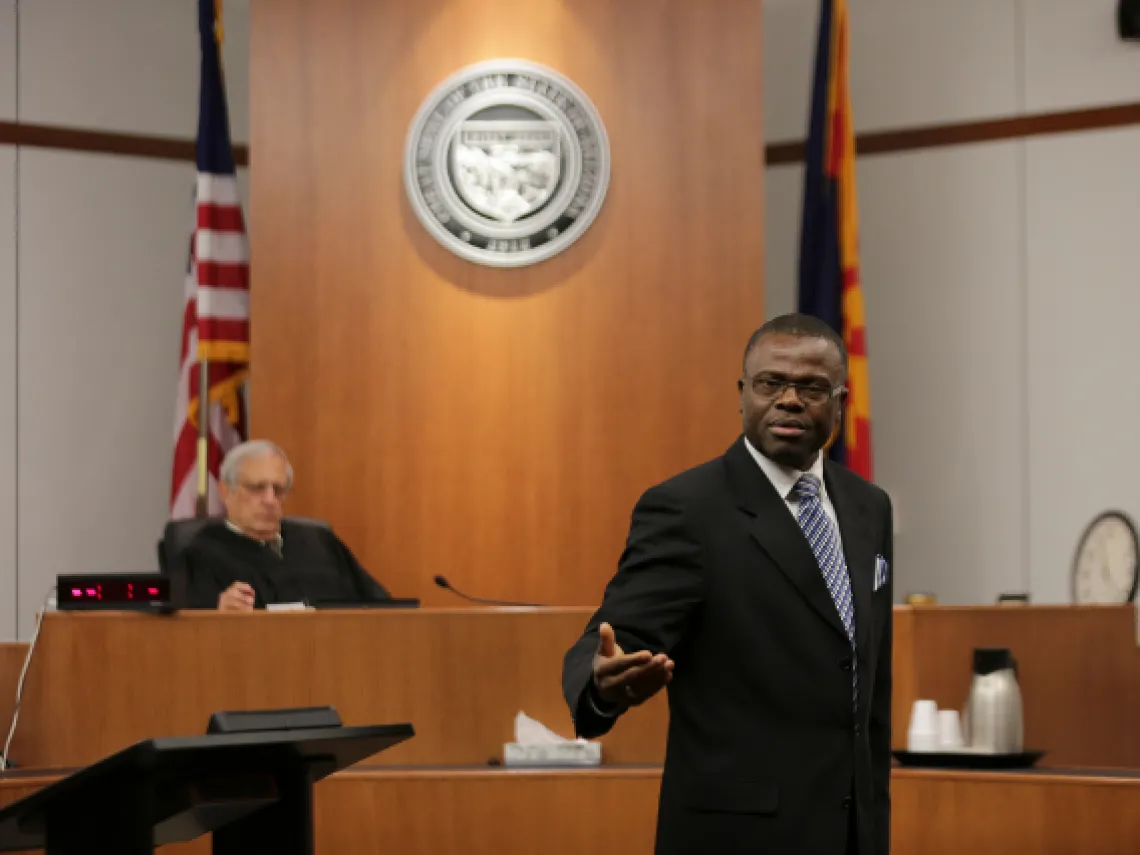Justice Shall Be Done: University of Arizona Law Brings Prosecutorial Ethics to Life
New series is part of an ongoing effort to create a national forum for discussion of issues in criminal prosecution.

As the lead Army prosecutor in the 2017 headline-grabbing case against Sgt. Bowe Bergdahl, the biggest hurdles Maj. Justin Oshana faced were not found in the court room, but in the oval office.
Oshana recounted his experiences navigating the case and surrounding publicity to a room of University of Arizona Law JD students in September 2021 during the inaugural session of “Prosecutorial Ethics in Real Life,” a speaker series hosted by Professor of Practice Paul Charlton (BA '83, JD ‘88). The series is part of an ongoing effort at University of Arizona Law to create a national forum for discussion of significant and timely ethical issues in criminal prosecution.
As Oshana explained, Bergdahl, who had wandered from his post in Afghanistan and was then captured by the Taliban, had been court-martialed for desertion after being released and returning home. Commentary surrounding the case was widespread, including from then-candidate Donald Trump, who turned Bergdahl into a campaign theme, calling him a traitor and suggesting that he should be executed.
A few months later, Trump would become president, and his criticism as the new commander in chief raised questions as to whether Bergdahl could receive a fair military trial.
“Bergdahl, like every American, deserved to have his actions judged, not on the campaign trail, not on cable news, but in a court of law,” wrote Oshana at the time in an op-ed for The Washington Post.
During Oshana’s lecture, he explained that Bergdahl’s defense filed a motion to dismiss the charges, contending that the effect of the president’s statements violated a prohibition on unlawful command influence, a legal concept in military justice. The judge declined to dismiss the case, but Oshana was still faced with a difficult choice. He could confront the president and face potentially negative repercussions or stay silent knowing that his side was benefiting off the attacks being made at Bergdahl’s expense. Ultimately, he chose to have a frank conversation with the executive branch.
“I continue to believe that part of my obligation as trial council in that case was to do what I could to ensure that the accused had a fair trial, and I did not think it was fair for anyone to publicly condemn the defendant in that way, most of all the President of the United States,” said Oshana during his talk.
Oshana’s experience highlights the power prosecutors hold throughout the judicial process—from charging decisions to sentencing recommendations, bail requests and even evidence disclosure.
In 1940, then-Attorney General Robert Jackson, later a U.S. Supreme Court justice, succinctly described prosecutorial authority when speaking to a group of federal prosecutors at an annual conference. “The prosecutor has more control over life, liberty and reputation than any other person in America,” Jackson said. “His discretion is tremendous.”
Series speakers included Oshana and two additional high-profile and nationally recognized prosecutors who, so as to promote open and frank discussions, spoke to the student body with the agreement that their conversations would remain private and not be publicized. Charlton chose each participant because of ethical tests they had faced during their careers. “This was a group of people who understood the gravity of their choices and the importance in maintaining a sense of ethics in their work,” he said.
Additional speakers will be added to the lineup for the spring semester, but Charlton hopes to grow beyond just lectures in the coming year; he has set a goal of eventually developing a full-fledged prosecutorial ethics program that examines the ethical obligations that accompany the immense influence of the position and educates future prosecutors early in their career on how to ethically approach a case.
“We focus so much during law school on unjust convictions and how to remedy them. We rarely focus on why the prosecutor brought such a case and who mentored them into thinking this way,” explained Charlton. “If we instead teach lawyers how to bring an ethical case forward then we’ve solved a huge problem in our legal system.”
